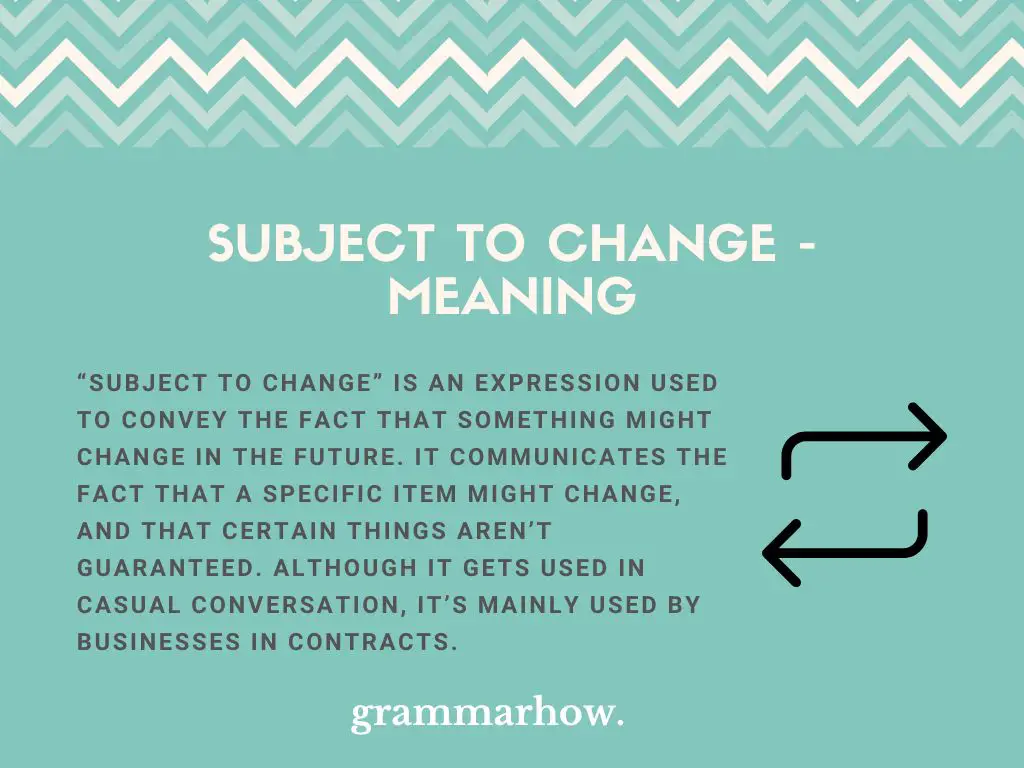“Subject to change” is a phrase you may have seen in a lot of contexts. You might just be wondering what it means when something “may be something to change”. This article is going to fully answer what it means when something is “subject to change”.
Subject to Change – Meaning
“Subject to change” is an expression used to convey the fact that something might change in the future. It communicates the fact that a specific item might change, and that certain things aren’t guaranteed. Although it gets used in casual conversation, it’s mainly used by businesses in contracts.

Businesses use “subject to change” a lot in their documentation. This is because documents are legally binding. By adding “subject to change”, they can change things in the future, even if the contract is binding.
Here’s an example to showcase how “subject to change” can be used:
- Right now I have three free rooms in my house, though of course that is subject to change.
In this example, someone is talking about their amount of empty rooms. They say that there’s three. However, to reflect the fact that they might be occupied eventually, they say that it’s “subject to change”.
Here’s a different example that will show you how to use “subject to change” in a sentence:
- It’s subject to change depending on circumstances, but I can afford a nice car right now, at the very least.
In this example, the person is saying that they might not have the money to get a nice car in the future. However, they do have that money in the present day.
Take a look at this final example:
- You’ll be working at the main work branch, and it’s not subject to change.
This phrase uses the negative “not subject to change” to emphasize that something is definitive. In this case, the definitive thing is the person’s new workplace.
“Subject to Change” Disclaimer Examples
“Subject to change” can be a very useful disclaimer in many contexts. Here are some example sentences that demonstrate how you can use it as a disclaimer:
- We will provide you with an all-paid room for a period of one week, may be subject to change.
This disclaimer says that while you’ll get an all-paid room, the period of time might change.
Here’s another example:
- Your salary can’t be upgraded in your first three months of work, subject to change.
This is an example where you won’t get a raise in your first three months. However, there’s a “subject to change”. This means there’s a small chance to get a raise in that time.
Check out this example out as well:
- If you win, we will mail you a new, personalized mountain bike (subject to change).
In this scenario, there’s a contest. If you win the contest, you might get a mountain bike. However, the prize might change. That’s why the “subject to change” is used.
Subject to Change – Synonyms
“Subject to change” is a way to signal that something might change in the future. There are other English phrases that can convey this fact as well. Here are some synonym phrases you can use instead of “subject to change”:
- Might change in the future
- Not guaranteed
- Might be switched up
- Might be changed
- Conditional
Subject to Change or Subjected to Change?
You should use “subject to change” and avoid “subjected to change”. While “subjected to change” isn’t grammatically incorrect, it doesn’t mean the same thing as “subject to change”. “Subjected to change” means that something in the past changed. “Subject to change” means it might change in the future.
Here are some examples of both phrases, helpfully labeled “correct” and “incorrect”:
- Correct: Your salary starts out like this, but prices are subject to change.
- Incorrect: Whether you get the job or not is subjected to change.
- Correct: Your schedule is subject to change, we’ll inform you if it does.
- Incorrect: It’s subjected to change whether we actually receive the case properly.
In What Situations Can You Use “Subject to Change”?
There are plenty of situations when you can use “subject to change”. If you’re writing a legal document, you can use “subject to change”. You can also use it in casual conversation. These are both fairly different scenarios, but they both make good use of “subject to change”.
If you don’t want to commit yourself to something in writing, you can use “subject to change”.
What Is the Abbreviation for “Subject to Change”?
The abbreviation for “subject to change” is “STC”. If you see a legal document or paper that uses “STC”, you now know what it stands for. A lot of legal documents often use abbreviations instead of the full expressions. This makes the documents significantly easier to read.

Martin holds a Master’s degree in Finance and International Business. He has six years of experience in professional communication with clients, executives, and colleagues. Furthermore, he has teaching experience from Aarhus University. Martin has been featured as an expert in communication and teaching on Forbes and Shopify. Read more about Martin here.
